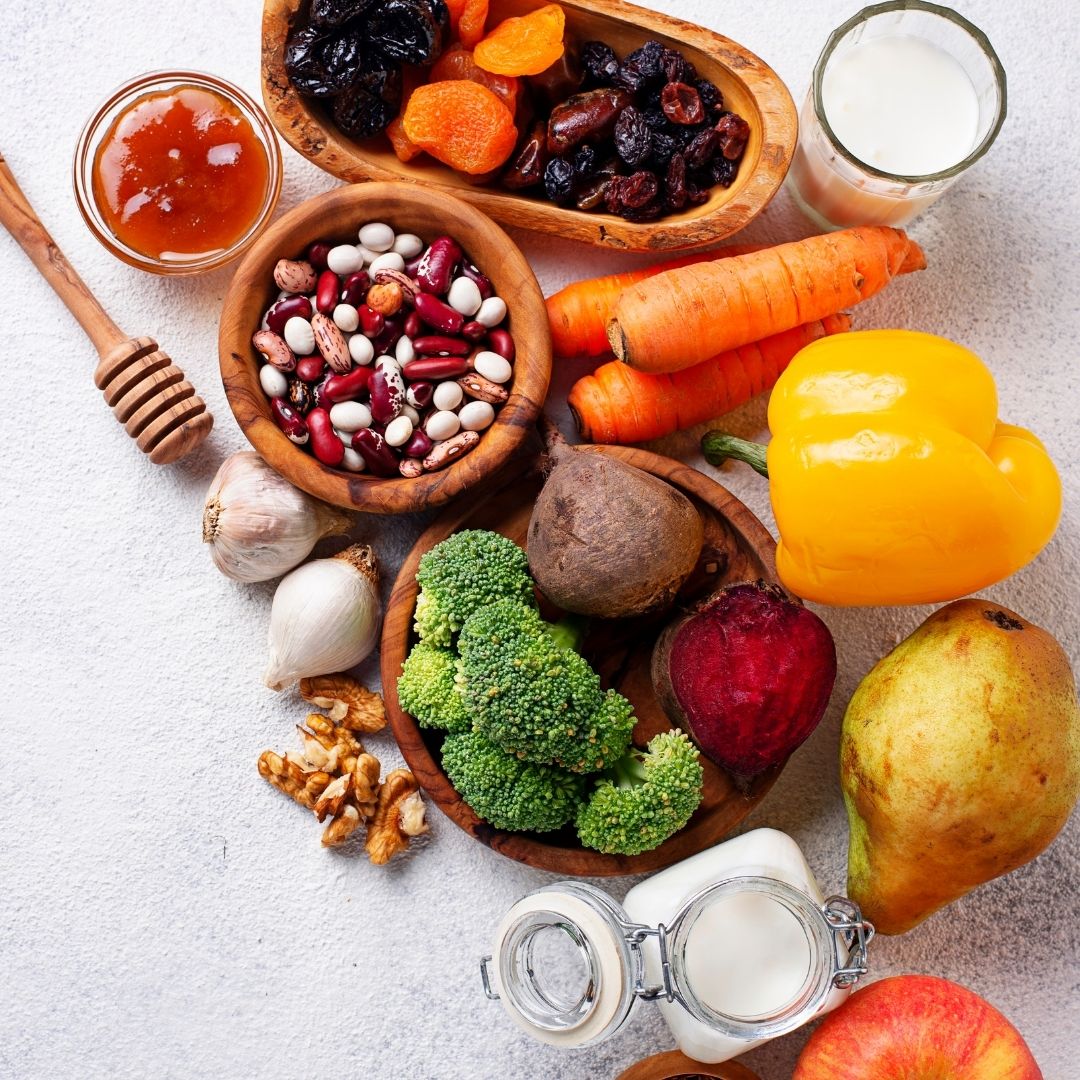
All About the Gut-Brain Axis, From a Nutritional Therapist
The extraordinary changes that we have experienced during these past few months, have taken a toll on the mental wellbeing of thousands.
According to the Centre for Mental Health UK, it was predicted that over 500,000 more people would experience mental health problems due to lockdown. Further studies prove that levels of mental distress have risen from 18.9% in 2019, to a shocking 27.3% only one month into lockdown (April, 2020).
Understanding the value of mental health has never been more important. At Kurami, we tackle mental wellbeing as well as physical wellbeing through the power of nutrition.
We were joined on our Instagram page by the knowledgeable Jade Bradley, a nutritional therapist and founder of Restore Nutrition. Jade is passionate about the relationship between mental health and food. In our discussion, we were able to delve deeper into the gut-brain connection, and how the food that we eat can influence our emotions and mental wellbeing.
Watch the full Instagram Live here.
-
You work as a nutritional therapist. What does this job entail?
There are many different things that I do as a nutritional therapist. One is mainly seeing clients privately; I work on a naturopathic and holistic basis. I do a full analysis on medical and family history, and ask about diet and lifestyle. This is important as it allows me to support them in making long term changes.
Outside of that, I do a lot of group work and I talk to different companies! My passion is supporting mental health alongside nutrition.
-
During these trying times, there has been an increase in concern with regards to mental stress levels. We love that you focus on supporting mental health, and you frequently discuss the link between our mental wellbeing and the foods that we eat. What led you to focus on the gut-brain connection?
What led me to study the link between nutrition and mental health was that, personally, I experienced anxiety throughout the entirety of my teenage years, which led into my adult life as well. I was never aware of the links between diet and lifestyle until I went down the normal route of medication, and it actually did me more harm than good; personally, it did not help me.
I then chose to go down the complementary therapy route; I identified food allergies and made a lot of changes to my lifestyle. When I did this, it was like a hallelujah moment for me. This led me to study holistic health and complementary therapy. That then led me down the rabbit hole to go and study at the College of Naturopathic Medicine in London. It sparked my interest immediately.
I believe this is something that should be taught at school rather than waiting for us to become unwell. We should be taught that we have control over our diet and lifestyle, which can help to support our mental and physical health.
Moreover, I was so fascinated to learn that the gut and the brain are formed at the same time in the womb, and that they are made with the same type of cells; they are intrinsically linked. It made total sense that looking after our gut is important, when looking after our mental health. When we are stressed, it activates our sympathetic nervous system. However, we do not want to be in fight or flight mode constantly; it causes our body to focus on pumping out oxygen to help us flee from danger, whereas we want to often be in rest and digest mode. Rest and digest mode enables the body to produce stomach acid that supports digestion, and it allows us to absorb all of our nutrients. It is apparent that we have been in a state of chronic stress for a prolonged period of time if you are not digesting properly and are unable to absorb the goodness of the food that you are eating, and it can therefore have long term impacts on your health.
-
Let us delve deeper into this. You regularly discuss dysbiosis. Why is understanding this key in understanding the gut-brain axis?
Dysbiosis is when we address the gut bacterial balance. We want there to be bacteria in the gut; it would not function as it should if it didn’t! We actually have more bacterial cells in our body than what we have actual human cells, but it is all about balance.
Dysbiosis occurs when the bad bacteria outweighs the good bacteria. This can be affected by a variety of different factors; it can be affected by stress, a diet high in processed foods, or a diet that is low in fibre. Fibre is essentially food made for our gut bacteria, as it allows the bacteria to thrive.
Another factor that can massively affect our gut bacterial balance is medication. Mediation is amazing, however when they are overused or misused, they can be very harsh on our digestive system—antibiotics in particular. Antibiotics can be overused, and they particularly have been throughout these recent months, which has led to an increase in warnings from the NHS advising against this. Although antibiotics are amazing for wiping out the bad bacteria, they can also wipe out the good.
-
As we all know, gut health has now become a buzzword. Here at Kurami, not only do we focus on creating nutritiously delicious meals, but we also work to build a balanced and positive discourse around food. On social media, however, we see that a lot of the food discourse is surrounded by “stress” and “anxiety”, and as you have discussed, a key element in following a balanced lifestyle is managing stress. How does social media contribute to the stress around food?
I feel like there are many different factors to be considered here. There are many unrealistic expectations that are set within social media. We now have a lot of celebrity influencers that can sell products such as fat loss pills and skinny teas, whilst failing to advise that they have a whole team of people that look after them; they probably do not even use these products as they are paid to endorse these, which is really frustrating.
I will say, however, that I have noticed there are positive influencers out there! They are breaking the stigma of body image and presenting real bodies! I’d love to see more of that. I also love seeing professionals and businesses that provide factual information that people can absorb. It is all about being careful of who you follow and what information you take on board.
-
We create nutritionist-approved, delicious and filling meals for Londoners that are constantly on-the-go! What do you think about pre-packaged food and meal plans? Can pre-prepared meals help lessen stress around food, and promote a more balanced lifestyle?
Definitely! They are amazing for people that are on the go and do not have the time to cook. I have seen many meal prep companies previously that focus on calorie content over nutrient density. I have had a lot of clients that are on certain meal plans, and I have had to tell them to add vegetables and ingredients into their meals as they fail to meet their required nutrient intake.
With Kurami, it is amazing. Also, the truffles look amazing! The fact that you focus on nourishment is so important. It is all about providing the nutrients that can support health and wellbeing. A lot of the time it is also about creating healthy relationships with food! We need to make sure that we are getting our good quality carbohydrates, our healthy fats and our fibre—these are amazing for supporting our health and wellbeing, and I find that the overall way that you approach this is amazing.
-
Kurami meal paths uniquely focus on the gut, how so?
At Kurami, we focus on providing variety by including thirty types of fruit, vegetables and herbs in our full weekly boxes. We also love to find foods that are richer in fibre than their usual counterparts. For example, in our pancakes, we have switched out white flour with teff and flax seeds, to ensure you start your day off on the right foot, with the right food.
-
What are some tips we can give our audiences to help reduce stress?
Managing our blood sugars is really important as it can stimulate the production of cortisol, our stress hormone. There are many ways that we can get healthy alternatives to high sugar foods such as the signature Kurami truffles, dates and fruit! There are so many ways that we can have sweet foods in our diet without the overconsumption of refined sugar.
Caffeine can also stimulate our flight and fight response. It can take twelve hours for our body to metabolise caffeine, which can in turn affect the quality of our sleep. This can be avoided by consuming coffee before 12pm. Feeding into the sleep aspect, this is so important for taking care of our mental health. If we are eating the right foods such as foods that are rich in magnesium, this can help support our immune system, sleep, lung function, and so many more!
Finally, technology and artificial light can also play a large role in affecting sleep hygiene. Simply cutting off screen time an hour before you head to bed is a game changer. Also a good evening routine and relaxation is important! Yoga, meditation and breathing exercises are backed by scientific evidence to increase our anti-anxiety neurotransmitter, GABA! But really, it is all about finding whatever floats your boat, as long as it can help you support your mental health and wellbeing.
Overall…
Jade is truly well versed within this field, and she was able to deeply explore the gut-brain axis. This interesting conversation exhibits just how important it is to build a balanced relationship with food to support both our mental and physical health—it goes beyond simply changing the way that we eat, it also includes changing the way we view the foods that we eat.



